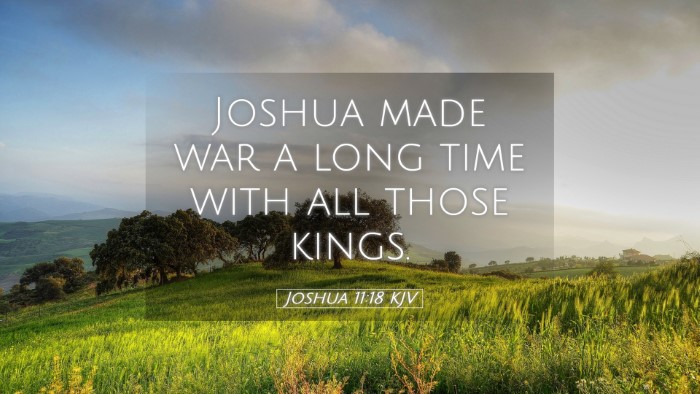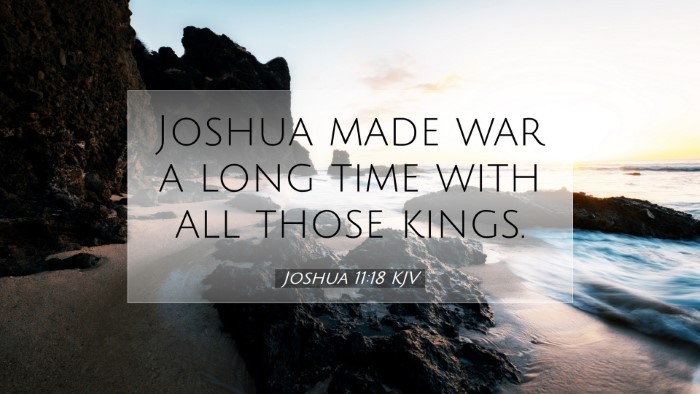Old Testament
Genesis Exodus Leviticus Numbers Deuteronomy Joshua Judges Ruth 1 Samuel 2 Samuel 1 Kings 2 Kings 1 Chronicles 2 Chronicles Ezra Nehemiah Esther Job Psalms Proverbs Ecclesiastes Song of Solomon Isaiah Jeremiah Lamentations Ezekiel Daniel Hosea Joel Amos Obadiah Jonah Micah Nahum Habakkuk Zephaniah Haggai Zechariah MalachiJoshua 11:18
Joshua 11:18 KJV
Joshua made war a long time with all those kings.
Joshua 11:18 Bible Commentary
Commentary on Joshua 11:18
Verse: "Joshua made war a long time with those kings." (Joshua 11:18)
Introduction
The book of Joshua marks a significant transition in the narrative of Israel, portraying the conquest of the Promised Land following Exodus. Joshua 11:18 serves as a pivotal verse reflecting the prolonged period of conflict that Israel engaged in to secure their inheritance. This commentary synthesizes insights from notable public domain scholars including Matthew Henry, Albert Barnes, and Adam Clarke, providing depth to the understanding of this verse.
Contextual Background
Israel’s conquest of Canaan was not an isolated event but rather a series of military campaigns under Joshua's leadership, characterized by both divine intervention and strategic warfare. The context surrounding Joshua 11 includes the trials faced by Israel as they confront formidable coalitions formed by Canaanite kings, determined to resist the incursion of the Israelites into their territory.
Historical Significance
This verse signifies the culmination of Joshua's military strategy and God's promise to deliver the land to the Israelites. The Hebrew understanding of warfare was not merely about physical struggle but was intricately tied to covenant promises and divine faithfulness.
Thematic Analysis
The prolonged warfare described in this verse resonates with several key themes in Biblical leadership and theology:
- Persistence in Faith: The phrase "made war a long time" illustrates the relentless pursuit of God's directives even amid adversity. Year after year, the Israelites clung to their faith in God's promises, demonstrating the necessity of perseverance in spiritual endeavors as emphasized by Matthew Henry.
- God's Sovereignty and Human Effort: Scholars like Adam Clarke highlight the tension between divine sovereignty and human agency. While the Israelites fought, they did so under the conviction that their efforts were sanctioned by God, who had already ordained the outcome of the conflict.
- The Multiplicity of Struggles: Albert Barnes comments on the multiplicity of adversaries that Israel faced, suggesting that the varied kings represented not just physical enemies but also spiritual challenges that required Israel to continuously depend on divine strength.
Commentary Insights
Matthew Henry's Exposition
Matthew Henry emphasizes that the lengthy duration of the warfare was necessary for the complete subjugation of the enemies. He reflects that not every battle was fought with equal intensity, and some skirmishes were designed to teach Israel reliance on God’s providence. He notes that this period served as both a testing ground and a refining process for the nation, reinforcing their identity as God’s chosen people.
Albert Barnes' Interpretation
Albert Barnes relates the prolonged conflict to the broader theme of struggle in the Christian life. He draws parallels to the spiritual battles believers face, inferring that the length of Israel's military engagements mirrors the ongoing spiritual warfare Christians endure. He encourages believers to embrace the fight against sin and the world, echoing the sentiment that faith often necessitates extended periods of struggle.
Adam Clarke's Reflection
Adam Clarke goes deeper into the implications of warfare, pointing out that the enemies faced by Joshua were not simply geographical but symbolic of the deeper spiritual strife within humanity. Clarke argues that the warfare conducted by Joshua was divinely ordained as a means to establish a holy nation, free from the perils of idolatry and sin. He cautions against misinterpreting such historical accounts purely through a lens of physical conflict, urging readers to recognize the spiritual realities behind Israel's battles.
Theological Implications
This verse prompts vital theological reflections on the nature of warfare, divine justice, and human responsibility. The graphic depiction of war underscores the serious implications of Israel’s covenant relationship with God, who commanded them not to leave any remnants of idolatry. The persistent engagement against their enemies serves as a metaphor for the Christian's daily struggle with sin and temptation.
Covenantal Relationships
The wars fought were necessary not only for land acquisition but also for the establishment of Israel as a theocratic entity. Their success was contingent on adherence to God’s laws and faithfulness in battle, symbolizing a deeper relational covenant with God. This notion serves as a reminder for those in leadership today to seek God earnestly and rely on His direction even amid prolonged challenges.
Practical Application
For pastors, students, and theologians, Joshua 11:18 is a reminder of the realities of spiritual warfare in the life of a believer. Believers are called to engage in their struggles with confidence, knowing that perseverance in faith can lead to ultimate victory through Christ. This verse encourages the faithful to understand when God allows extended trials, urging them to trust in His timing and purpose.
Conclusion
In Joshua 11:18, the narrative encapsulates the struggles faced in the conquest of Canaan, illustrating the interplay between divine promise and human endurance. Drawing from the insights of respected commentators, this analysis underscores important theological themes of perseverance, divine sovereignty, and the multifaceted nature of spiritual warfare. As one reflects on the historical context and its relevance today, it becomes clear that these ancient battles resonate with contemporary faith journeys, inviting believers to embark on their journeys with the assurance of God’s faithful presence amid struggles.


